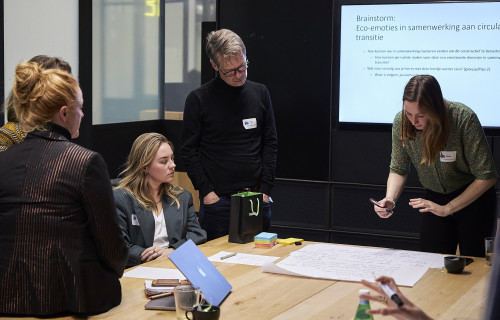Professionals in the field of circularity and sustainability may experience "eco-emotions," a spectrum of feelings which can have both negative and positive effects on mental health. Eco-emotions arise from ecological crises, such as climate change, and can lead to stress, fatigue, and a sense of powerlessness, but also heightened motivation for professionals.
This work session, led by Marian Zandbergen (CIRCOLLAB, HvA) and moderated by Mareille de Bloois (Royal HaskoningDHV) on the 14th of December, explored the challenges and opportunities associated with eco-emotions, both personally and within organizations. The key question addressed was: How can individuals and organisations constructively manage eco-emotions, and what implications does this have for organisations?
Defining eco-emotions
Eco-emotions are feelings resulting from ecological crises, which can be categorized into backward-looking and forward-looking emotions.
- Backward-looking eco-emotions: include eco-guilt, eco-grief, and eco-anger about past events, such as feeling guilty about the carbon footprint of a vacation flight.
- Forward-looking eco-emotions: encompass eco-anxiety, and focus on current and anticipated future decisions. While eco-anxiety can drive proactive engagement with ecological issues, excessive amounts may lead to feelings of helplessness.
Negative eco-emotions can thus harm your mental health and can even lead to burnout. Therefore, it is important to use strategies to counter the negative effects of eco-anxiety.
Changing attitudes - taking action
Attitudes shape behaviour, and self-efficacy—the belief in one's ability to contribute to problem-solving—is crucial. Concrete action perspectives empower individuals, fostering a sense of control over problems and mitigating feelings of helplessness of eco-anxiety.
Social support - acting as a group
Collaborative efforts within a group can positively impact perceived self-efficacy. Strong collaboration can turn negative effects of eco-anxiety into positive outcomes. Trust and shared motivation play vital roles in effective collaborations, fostering understanding across personal and organisational perspectives.
In the group - recognition and solutions
The participants of the workshop shared personal experiences of eco-emotions and brainstormed constructive ways to incorporate these emotions into circular transition collaborations. Ideas included conducting organizational research to understand the extent of eco-emotions and gain insight into personal motivations in businesses and collaboration, and demonstrating how intrinsic beliefs contribute to shared goals.
Proposed solutions
To address eco-emotions within organizations, various methods were proposed, including workshops with inspiration and practical applications, an HR framework, 'meet & share' sessions featuring talks with industry leaders, and personal purpose hours.
Marian expressed a desire to continue researching this topic, inviting contributions through qualitative interviews within organizations. Are you interested in contributing to this research, please let me know in the comments, or email me at noor@amsterdamsmartcity.com.



